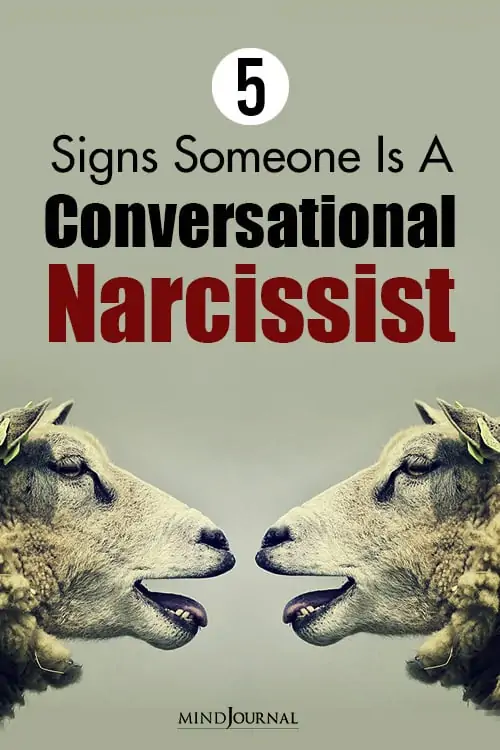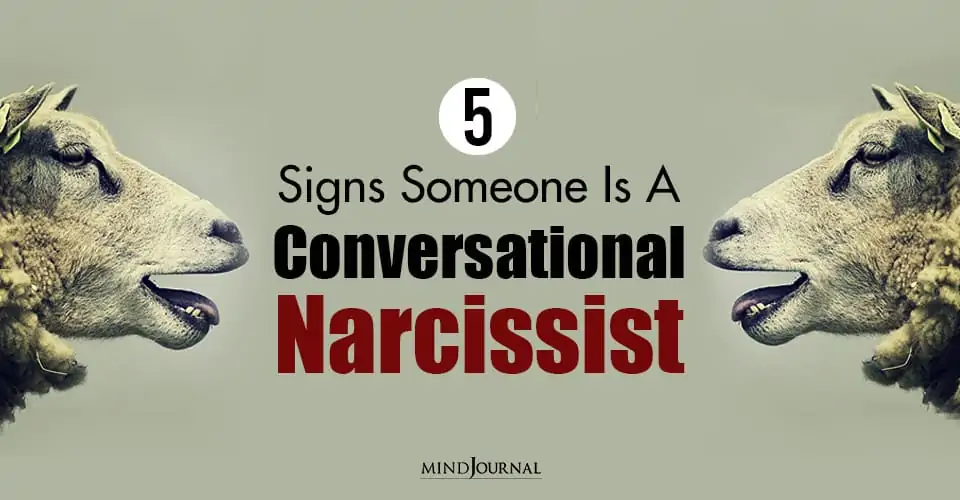Whenever you are dealing with a conversational narcissist, the signs are always there; you just have to look. The moment you see someone trying to dominate a conversation or sabotage it in their favor, congratulations, you have met one!
Most people have experienced being in a conversation with someone who is a conversational narcissist. The tendency to always bring the conversation back to themselves is inevitable when speaking to this person. They love making the conversation about them, their life, and their own experiences.
Unfortunately, they never really learned how to have a healthy back and forth dialogue. The reason for this varies depending on the person. All conversational narcissists have these traits in common.
Here Are 5 Signs Someone Is A Conversational Narcissist
1. They like to hear themselves talk.
This is the person that wants to speak. Most of us have been there; we are so self-absorbed in our thoughts and feelings that we forget we are having a conversation with someone else. We forget to move through the conversation and ask questions and let the other person speak.
We want to vent; we want to speak, and there is no room for a “discussion.”
When you are talking to someone who only wants to hear themselves speak, there is no room for you to get a word in because they will take over the entire conversation.
At any turn, whatever you were discussing can start a long-winded story about how the narcissist went through the same experience, and this is what happened to them. It can turn from venting about your tough day to trying to outshine you and discuss their life as much harder than yours.
Related: Conversational Narcissist: How To Deal With Someone Who Always Talks About Themselves
2. They crave talking about their dramas.
A conversational narcissist that loves talking about their struggles often sits in a victim role. They like this place because it gives them sympathy, which is attention. They cannot healthily move through difficult times but rather blame everyone and everything for their struggles.
While life can be hard at times, and we all need a safe place to let out our frustrations, it is important not to stay in that space. When you allow yourself to wait for too long, your mind will get comfortable in this negative zone. It will become accustomed to the attention it gets when it repeats the struggles and difficulties of life.
While this is the rational thinking of a healthy person, a conversational narcissist may not be equipped to have those self-reflecting thoughts.
3. The Bragger.
On the one hand, we might be dealing with a covert narcissist who loves to talk about their troubles to gain sympathy and attention; we are now dealing with the overt narcissist whose only job is to brag.
This is a form of self-absorption that comes from deep-rooted insecurities.
While it is healthy to have a good sense of self and have positive self-talk, it becomes a slippery slope when we begin boasting too much. It can quickly turn from healthy self-esteem to be proud of yourself to showing the world your deep-seated insecurities and need for recognition and praise.
4. They fake care.
With all toxic methods, things are not always black and white. At times you may have a conversation with someone who appears to be healthy. They seem to be engaged with you and ask you questions. They appear to be having an adult conversation, and then all of a sudden, they find a window to talk about themselves.
This is what I call “Fake Caring.” While they may love you, that does not stop their ability to want to talk. They may want the attention, the sympathy to vent, or to brag. Either way, you are having a conversation with the person who is bringing it back to themselves.
Regardless of how they turn the conversation back to themselves, there is one thing all these methods have in common… insecurity. Like with all narcissists, there are a lot of insecurities underneath the surface.
There are a lot of reasons why someone is a conversation narcissist. Some people do have Narcissistic Personality Disorder, while others are just conversational narcissists but are healthy and lovely otherwise. The reasons behind this behavior vary.
Related: How and Why Narcissists Try to Destroy You With Circular Conversations
5. Some people crave attention.
They will ask questions, but shortly after the conversation goes back to themselves and how they feel and what they think or change the subject and start talking about a story involving them.
Some people are oblivious to their behavior. This is for the people who are not narcissists but perhaps need to have a lot of self-awareness. They do not mean any harm; they are just wrapped up in themselves at times and are not mindful of their actions.
When you are insecure and at times have not felt heard, you are going to reach for extreme ways to be “seen.” This is true for a person who was raised by a self-absorbed, narcissistic parent. When it has never been about you, you may grow up and begin forming these unhealthy behaviors. It is a coping method that has helped you gain attention.
Written By Stephanie Lyn Originally Appeared On Stephanie Lyn Life Coaching
So, the next time you see someone constantly trying to dominate a conversation or trying to bring it back to themselves, know that they are showing signs of being a conversational narcissist. Don’t get riled up by this, because this is nothing else but their insecurity and obsessive need for attention speaking.









Leave a Reply
You must be logged in to post a comment.